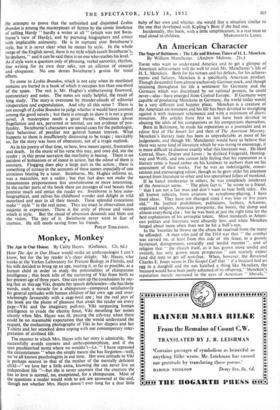Monkey, Monkey
The Ape in Our House. By Cathy Hayes. (Gollancz. 12s. 6d.) How The Ape in Our House would strike an anthropologist I can't know, but for the lay reader it's sheer delight. Mr. Hayes, who works at the Yerkes Laboratory for Primate Biology in Florida, and his wife decided to bring up an ape, treating it, as far as possible, as a human child in order to study the potentialities of chimpanzee intelligence ; this book tells of the nurturing of Viki from birth to her present age of three years. One can sum up the conclusions by say- ing that at this age Viki, despite her speech deficiencies—she has three words, each a miracle for a chimpanzee—compared satisfactorily for general aptitudes with human children of her own age and over- whelmingly favourably with a cage-bred ape ; but the real joys of the book are the plums of pleasure that await the reader on every page—Viki and the imaginary pull-toy, Viki surpassing human intelligence to evade the electric fence, Viki mouthing her noises silently when Mrs. Hayes was ill, passing the ash-tray when there could be no reasonable expectation that she would understand the request, the enchanting photographs of Viki in her diapers and her T-shirts and her smocked dress coping with our contemporary inter- pretation of civilised life.
The manner in which Mrs. Hayes tells her story is admirable. She successfully avoids coyness and anthropomorphism, and if she uses psychiatrical terms where we wouldn't--i.e. " I have repressed the circumstances "when she simply means she has forgotten—well, we've all known psychologists in our time. Her own attitude to Viki is perhaps nearest to that of the mother of the mentally deficient child—" we love her a little extra, knowing she can never live an independent life "—but she is never unaware that the creature she has to love is normal, no, exceptional, for a chimpanzee. M6st of the questions a reader would wish to ask are answered at the end, though not whether Mrs. Hayes doesn't ever long for a dear little baby of her own and whether she would fear a situation similar to the one that developed with Kipling's Bimi if she had one. Incidentally, this book, with a little simplification, is a real treat to


































 Previous page
Previous page